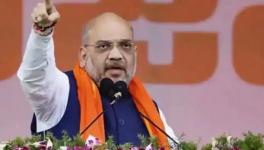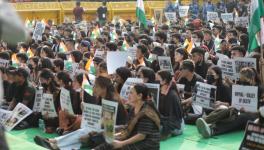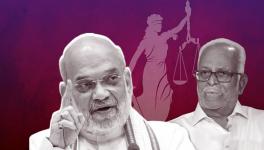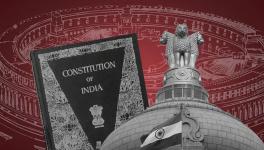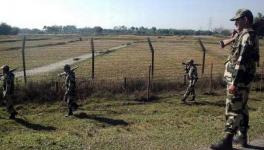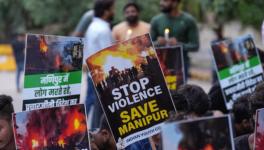In Kashmir, Grassroots Political Workers Continue to Struggle for Safety And Remuneration
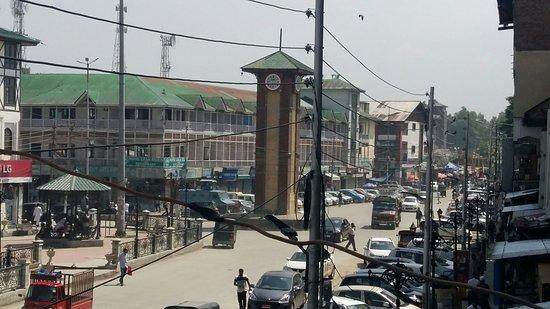
Representational image.
Nissar Ahmad has been living in constant fear since police asked him to leave his home and seek refuge in a secured government facility in the Pampore area of Pulwama district in southern Kashmir. He, along with dozens of other grass-roots political workers from Pampore and surrounding areas, have taken up residence at a government facility amid an increase in the killings of local bodyworkers in the valley. "I am scared because life is the most important thing. The fact that I am living away from my family during the holy month of Ramadan worries me the most,” he told NewsClick.
In the last seven weeks, four members of the Panchayati Raj Institutions (PRIs) – three sarpanchs and one panch – have been killed in militant attacks, the most recent of which was the killing of Manzoor Ahmad Bangroo, the sarpanch of Goshbugh village in Pattan's Baramulla district in north Kashmir. Last month, two sarpanchs were killed in south Kashmir's Kulgam district and another on the outskirts of Srinagar.
In the absence of an elected government in the union territory, these grass-roots political workers were heralded as the valley's new leaders. However, an uptick in killings has raised fears of a renewed militant onslaught on panchs and sarpanchs. The majority of them accuse the government of being unconcerned about their issues, whether it is providing security or paying a timely honorarium.
According to Ghulam Hassan Wani, Chairman of the Jammu and Kashmir Panchayat Raj Movement, an alliance of panchs and sarpanchs in the Union Territory, the situation is concerning, and panchayat members, as always, are the soft targets for militants due to a lack of security cover. "These killings have gripped us in fear as militants are killing us at will due to a lack of security cover. Over the years, the government has failed to provide us with adequate security, and if the situation persists, we will be forced to offer mass resignations,” he told NewsClick.
He believes that their target killings have increased since the government announced that elections would be held in the union territory after the delimitation process was completed. He informed them that Union Home Minister Amit Shah stated in Lok Sabha last month that they had no interest in keeping Jammu and Kashmir under the President's rule and that elections would be held after the delimitation.
While elections in Jammu and Kashmir are required, he believes the government should also ensure their security. Despite the killing of nearly 32 of their members since 2012, the government, he claims, has denied them security. “Whenever there are killings, New Delhi calls and promises us security, but it never delivers," he said.
There are approximately 33,000 panchs and sarpanchs in Jammu and Kashmir. Security forces find it difficult to provide security for them because half of their police force would be consumed, leaving the other half to deal with the valley's fragile law and order situation. The police, however, have begun night patrols of vulnerable areas and have installed additional security checkpoints to reduce the likelihood of attacks.
Some panchayat members have refused to live under security, claiming they are no longer active in the communities for which they fought elections. "We are afraid as well, but we cannot live in security because we fought elections to provide relief to the people. It is preferable to resign than to live outside of the community, "Nazir Ahamd, a sarpanch from one of south Kashmir's villages, told NewsClick.
He added that attacks have crippled the system because they are unable to hold gram sabhas, which are essential for ensuring people's participation in grass-roots democracy, and that "this is the biggest problem we are facing right now."
Panchayat elections were last held in Jammu and Kashmir in 2018. A significant number of seats remained vacant, particularly in south Kashmir, as the National Conference (NC) and People’s Democratic Party (PDP) remained absent and militants asked people not to vote. Bye-elections for these positions and those for District Development Councils were held in 2020 (DDCs).
HONOURARIUMS OF PANCHS, SARPANCHS PENDING FOR FIVE MONTHS
The majority of panchs and sarpanchs now regret running in these elections because they believe the government has forgotten them after the elections, evidenced by their lack of honoraria for the past six months.
Scores of these local body representatives told NewsClick that, while the administration claims to be strengthening the Panchayati Raj institution in Jammu and Kashmir, the delay in releasing the honorarium demonstrates the administration's disregard for these institutions. "Despite repeated government assurances that low-paid local body representatives would be paid on time, the honorarium of panchs and sarpanchs has been delayed for the past five months," said Bashir Ahmad, General Secretary of the Jammu and Kashmir Panchayat Raj Movement.
In the absence of an elected government, these local representatives have been working hard to carry out the main programs of the central government. Still, the government has not taken them seriously. They claimed that, while the honorarium was small, if it had been paid regularly, it would have given the sarpanch's family confidence in their ability to serve the people. "A panch receives 1000 rupees per month, while the sarpachs receive 3000 rupees. We are already struggling to make ends meet on such a low income, and waiting any longer will make things even more difficult for us," Mir Altaf, another local body head from south Kashmir, told NewsClick.
While the government claims that granting authority and funding will strengthen the PR system, the sarpanchs claim that the funds were not allocated in the same manner. According to them, some of the sarpachs' honoraria have been outstanding since 2016. "An outstanding sum of around nine crores was required to pay their salaries, but they were deficient by two crores," said another sarpanch, adding that despite their sacrifices, officials never took them seriously, causing the region's development to stall.
The writer is an independent journalist.
Get the latest reports & analysis with people's perspective on Protests, movements & deep analytical videos, discussions of the current affairs in your Telegram app. Subscribe to NewsClick's Telegram channel & get Real-Time updates on stories, as they get published on our website.










